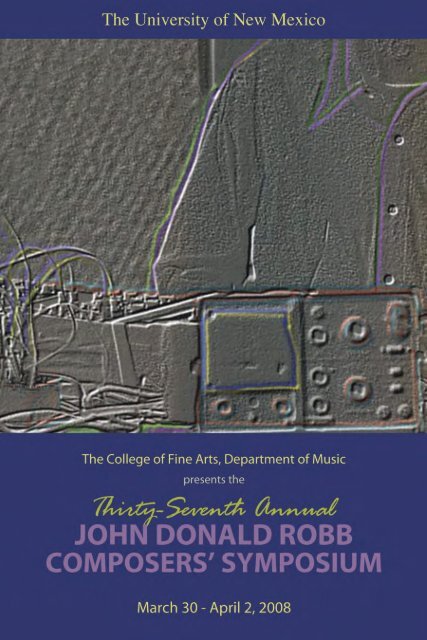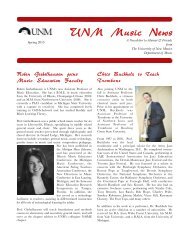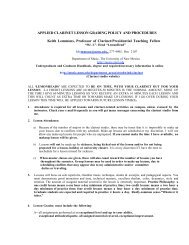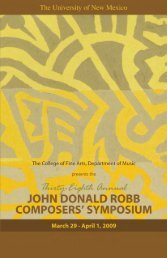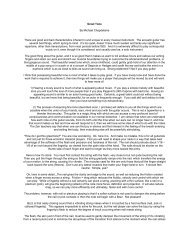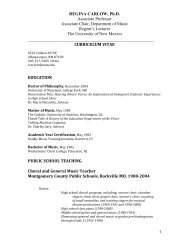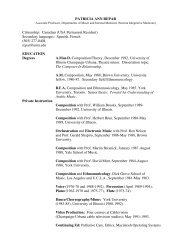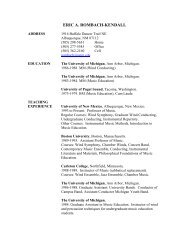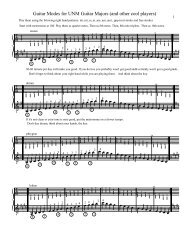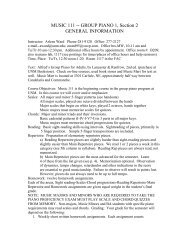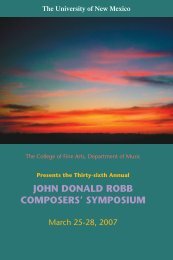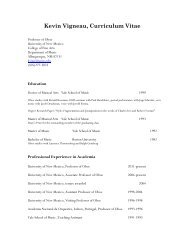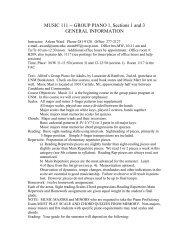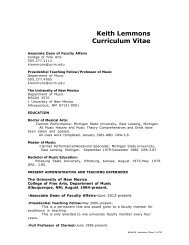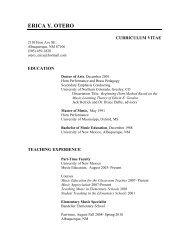37th Annual Composers' Symposium Program - Department of ...
37th Annual Composers' Symposium Program - Department of ...
37th Annual Composers' Symposium Program - Department of ...
You also want an ePaper? Increase the reach of your titles
YUMPU automatically turns print PDFs into web optimized ePapers that Google loves.
John Donald Robb Composers’ <strong>Symposium</strong><br />
Featured Composer: Gordon Mumma<br />
Curt Cacioppo<br />
Richard Cameron-Wolfe<br />
Dawn Chambers<br />
Anne Marie Guzzo<br />
Richard Hermann<br />
John Kennedy<br />
Carlo Alessandro Landini<br />
Yvonne Lee<br />
Daniel Lentz<br />
Paul Lombardi<br />
Ensemble in Residence<br />
Duo Alterno<br />
Panaiotis<br />
Steve Peters<br />
Riccardo Piacentini<br />
John Donald Robb<br />
Christopher Shultis<br />
Falko Steinbach<br />
Molly Sturges<br />
Daniel James Wolf<br />
William Wood<br />
<strong>Symposium</strong> events are held at the<br />
University <strong>of</strong> New Mexico, Center for the Arts.<br />
All events are free and open to the public<br />
Dr. Christopher Mead, Dean, College <strong>of</strong> Fine Arts<br />
Dr. Steven Block, Chair, <strong>Department</strong> <strong>of</strong> Music<br />
Composers’ <strong>Symposium</strong> Staff<br />
Dr. Christopher Shultis, Artistic Director<br />
Doris Williams, Managing Director, John D. Robb Musical Trust<br />
Timothy Saeed, Graduate Assistant, John D. Robb Musical Trust<br />
Victoria Weller, Keller Hall Manager<br />
Manny Rettinger, Audio Engineer<br />
Cover art: © 2005 Courtesy <strong>of</strong> Anthology <strong>of</strong> Recorded Music. All rights reserved.
John Donald Robb<br />
John Donald Robb (1892-1989) led a rich<br />
and varied life as an attorney, composer, arts<br />
administrator, and ethnomusicologist. He<br />
composed an impressive body <strong>of</strong> work including<br />
symphonies, concertos for viola and piano,<br />
sonatas, chamber and other instrumental music,<br />
choral works, songs, and arrangements <strong>of</strong> folk<br />
songs, two operas, Dontero and Little Jo, a<br />
musical comedy, Joy Comes to Deadhorse, and more than sixty-five<br />
electronic works. Robb’s orchestral works have been played by many<br />
major orchestras in the U.S. and abroad and under noted conductors<br />
such as Hans Lange, Maurice Abravenel, Leonard Slatkin, Gilberto<br />
Orellana, and Yoshimi Takeda, among others.<br />
During his two decades as an international lawyer in New York,<br />
Robb studied composition with Horatio Parker, Darius Milhaud, Roy<br />
Harris, Paul Hindemith and Nadia Boulanger. In 1941, at the age <strong>of</strong><br />
49, Robb left his law career to become head <strong>of</strong> the Music <strong>Department</strong><br />
at the University <strong>of</strong> New Mexico and served as Dean <strong>of</strong> Fine Arts<br />
from 1942-57. During his tenure at UNM, Robb’s fascination with<br />
Hispanic folk music led to his collection <strong>of</strong> over 3,000 field recordings<br />
<strong>of</strong> traditional songs and dances from the American Southwest, South<br />
America and Nepal which formed the nucleus <strong>of</strong> the John Donald<br />
Robb Archive <strong>of</strong> Southwestern Music at the University <strong>of</strong> New<br />
Mexico. He wrote two books on the subject, including Hispanic<br />
Folk Songs <strong>of</strong> New Mexico (1954) and his authoritative book Hispanic<br />
Folk Music <strong>of</strong> New Mexico and the Southwest: A Self Portrait <strong>of</strong> the<br />
People (1980). Robb received numerous honors and grants during his<br />
lifetime including the honorary Doctor <strong>of</strong> Music from the University<br />
<strong>of</strong> New Mexico. The Saint Louis Symphony premiered his Third<br />
Symphony in 1962. OPUS ONE has released a recording <strong>of</strong> seven<br />
Hispanic folk songs and six art songs arranged by Roger Jannotta<br />
and performed by the National Polish Radio Symphony Orchestra<br />
under the direction <strong>of</strong> David Oberg with Leslie Umphrey, soprano<br />
and member <strong>of</strong> the UNM Music <strong>Department</strong> Faculty, as soloist.<br />
This is one <strong>of</strong> four CD recordings <strong>of</strong> Dean Robb’s major works by<br />
this orchestra, all conducted by David Oberg and available through<br />
Amazon.com.
John D. Robb Musical Trust was established at UNM in 1989 by<br />
John D. and Harriet Robb. The mission <strong>of</strong> the Trust, in collaboration<br />
with UNM, is to support the music and musical legacy <strong>of</strong> John<br />
Donald Robb, to further his inspiring commitment to education and<br />
to advance the understanding <strong>of</strong> music <strong>of</strong> the Southwest. Since 1989,<br />
the Trust has supported the editing <strong>of</strong> many <strong>of</strong> Robb’s compositions;<br />
performances <strong>of</strong> his and other composers’ work at the UNM<br />
Composers’ <strong>Symposium</strong>s and other national and regional venues; a<br />
scholarship for the study and performance <strong>of</strong> Robb’s piano work;<br />
several CD recordings, including those with the Polish National Radio<br />
Symphony Orchestra; a comprehensive exhibit celebrating the life and<br />
work <strong>of</strong> Robb at Zimmerman Library; and many other projects. The<br />
Trust established the John D. Robb Assistantship at UNM in 2000 and<br />
initiated the John D. Robb New Mexico Composers’ Competition<br />
in 2003. The Third Biennial UNM John Donald Robb Composers’<br />
Competition has made the competition available to composers<br />
nationally and increasing the winning prize to $3,500. In so doing, the<br />
Trust hopes to capture the interest <strong>of</strong> aspiring composers, academics,<br />
and visiting scholars. The 2007-2008 Competition will be judged<br />
by an international panel <strong>of</strong> judges: Julio Estrada, Composer &<br />
Research Pr<strong>of</strong>essor, Universidad Nacional Autónoma de México;<br />
Robert Morris, Composer & Research Pr<strong>of</strong>essor <strong>of</strong> Music, Eastman<br />
School <strong>of</strong> Music; and Barbara Rettagliati, Composer & Pr<strong>of</strong>essor <strong>of</strong><br />
Composition, Conservatorio Statale di Musica “Luigi Cherubini”,<br />
Florence, Italy. The winning composition will be performed at<br />
the 2009 Composers’ <strong>Symposium</strong>. In fall 2007, the New Mexico<br />
Symphony Orchestra, conducted by Guillermo Figueroa, performed<br />
Dean Robb’s Suite <strong>of</strong> Dances from Taxco as part <strong>of</strong> its regular concert<br />
series and also as part <strong>of</strong> its tour program at the Spencer Theatre in<br />
Ruidoso. In 2008, PBS affiliate KNME-TV-5 will begin work on a<br />
documentary for the ¡Colores! television series devoted to the music<br />
and musical legacy <strong>of</strong> Dean Robb. A permanent and interactive web<br />
site on Dean Robb by KNME-TV will be launched in conjunction<br />
with the ¡Colores! program.
Featured Composer<br />
Gordon Mumma<br />
Gordon Mumma was born 1935 in<br />
Framingham, Massachusetts.<br />
His first piano lessons were in<br />
Farmington, New Mexico, where<br />
he was living with his grandparents<br />
for several months during the<br />
Second World War. During his<br />
Junior High school years in a<br />
suburb <strong>of</strong> Chicago he had his<br />
first horn lessons. He continued<br />
his private piano and horn lessons during his Michigan High School<br />
years In Detroit and his University years in Ann Arbor, performing<br />
regularly in chamber ensembles and orchestras.<br />
From 1953 to 1966 Gordon Mumma lived in Ann Arbor, Michigan,<br />
where he co-founded with Robert Ashley the Cooperative Studio<br />
for Electronic Music and the now-historic ONCE Festivals <strong>of</strong><br />
Contemporary Music. From 1966 to 1974 he was, with John Cage<br />
and David Tudor, one <strong>of</strong> the three composer-musicians with the Merce<br />
Cunningham Dance Company, and performed on international tours<br />
with Robert Ashley, David Behrman, and Alvin Lucier in the Sonic<br />
Arts Union. His musical compositions include works for acoustical<br />
instruments (mostly solo piano and chamber music), as well as for<br />
electronic and computer resources.<br />
He has also worked with diverse artists such as Tandy Beal,<br />
Anthony Braxton, Marcel Duchamp, Fred Frith, Toshi Ichiyanagi,<br />
Jasper Johns, Jann McCauley, Pauline Oliveros, Yvonne Rainer, Tom<br />
Robbins, Frederic Rzewski, Stan Van Der Beek, William Winant, and<br />
Christian Wolff.<br />
Mumma has made concert tours and recordings in North and South<br />
America, Japan and Europe. His writings on the contemporary<br />
performance arts and technology are published in several languages.<br />
His best-known engineering design was for an electronic-music live-
performance system at EXPO-70 (Osaka, Japan). A major part <strong>of</strong><br />
his electronic music, and some <strong>of</strong> his music for piano and chamber<br />
ensembles, is available on compact-disks from Lovely Music, New<br />
World Records, and Tzadik. A large collection <strong>of</strong> his piano solo music,<br />
performed by the Belgian virtuoso Daan Vandewalle, is forthcoming<br />
on a set <strong>of</strong> CDs in 2008.<br />
Now Pr<strong>of</strong>essor Emeritus, Mumma was Pr<strong>of</strong>essor <strong>of</strong> Music at the<br />
University <strong>of</strong> California, Santa Cruz from 1975 to 1994. He has been<br />
the Darius Milhaud Pr<strong>of</strong>essor at Mills College, and on the faculties<br />
<strong>of</strong> Brandeis University, the University <strong>of</strong> Illinois, the Ferienkurse für<br />
Neue Musik (Darmstadt Germany), and the Cursos Latinoamericanos<br />
de Musica Contemporanea (Argentina, Uruguay, and Republica<br />
Dominicana).<br />
In 2000, Mumma received the biennial John Cage Award from the<br />
Foundation for the Contemporary Arts. Since 2004 he has been<br />
associated with the University <strong>of</strong> Victoria, British Columbia.
John Donald Robb Composers’ <strong>Symposium</strong><br />
Daytime Schedule 2008<br />
Monday, March 31<br />
9:00 Welcome: Steven Block, Chair, <strong>Department</strong> <strong>of</strong> Music<br />
PANEL DISCUSSION: Kurt Frederick Hall (B-120)<br />
“Composers and the World Wide Web”<br />
Steve Peters, Daniel James Wolf, Anne Guzzo<br />
Christopher Shultis, moderator<br />
10:00 MEET THE COMPOSER: Kurt Frederick Hall (B-120)<br />
Daniel Lentz, Richard Cameron-Wolfe<br />
11:00 COMPOSITION SEMINAR: B-117<br />
Daniel James Wolf, Yvonne Lee, Daniel Lentz<br />
William Wood, Christopher Shultis, moderators<br />
12:00 LUNCH for all visiting composers<br />
2:00 MEET THE COMPOSER: Kurt Frederick Hall (B-120)<br />
Gordon Mumma lectures on his music and/or musical concerns<br />
4:00 COMPOSER LISTENING SESSION CFA 2100<br />
Listen to recorded examples <strong>of</strong> music by composers featured<br />
at this year’s symposium.<br />
Tuesday, April 1<br />
9:30 MEET THE COMPOSER: Kurt Frederick Hall (B120)<br />
Riccardo Piacentini, Yvonne Lee, Anne Guzzo<br />
11:00 MEET THE COMPOSER: Kurt Frederick Hall (B-120)<br />
Daniel James Wolf, Carlo Alessandro Landini<br />
12:30 COMPOSITION SEMINAR FOR<br />
BEGINNING STUDENTS: CFA 1108<br />
Anne Guzzo, Richard Cameron-Wolfe<br />
2:00 CONCERT: Keller Hall<br />
5:30 MEET THE COMPOSER: Steve Peters<br />
UNM Art Museum Lower Level Gallery
Wednesday, April 2<br />
9:00 GUEST LECTURE: Kurt Frederick Hall (B-120)<br />
“The ONCE Festival: A Model for the Future?”<br />
Ralf Dietrich, ONCE Festival scholar and guest lecturer<br />
10:00 MEET THE COMPOSER: Kurt Frederick Hall (B-120)<br />
John Kennedy, Dawn Chambers<br />
11:00 COMPOSITION SEMINAR: B-117<br />
Carlo Alessandro Landini, Gordon Mumma, Dawn Chambers<br />
William Wood, Christopher Shultis, moderators<br />
12:30 COMPOSITION IN A VIRTUAL REALITY ENVIRONMENT:<br />
Center for High-Performance Computing<br />
Raven Chacon, Robert Putnam, Maria Williams,<br />
Patrick Willink, moderators. (Lunch will provided.)<br />
2:00 ASK THE COMPOSER: Kurt Frederick Hall (B-120)<br />
Gordon Mumma responds to any questions or issues posed by<br />
the audience.<br />
4:00 COMPOSER LISTENING SESSION CFA 2100<br />
Listen to recorded examples <strong>of</strong> music by composers featured at<br />
this year’s symposium.
CONCERT PROGRAMS<br />
Installations<br />
Filtered Light (Chamber Music 4) (2008) Steve Peters<br />
This installation runs continuously throughout the symposium in the lower<br />
level <strong>of</strong> the UNM Art Museum.<br />
Yada, Yada, Yada: video and music installation (2008) Panaiotis/Jennifer<br />
Predock-Linnell<br />
This installation runs continuously throughout the symposium in the Center<br />
for the Arts main lobby.<br />
CONCERT I<br />
Sunday, March 30, 2008<br />
3:00 and 4:00 p.m. Center for the Arts Main Lobby<br />
(two performances)<br />
Impr’Opera (2008) Molly Sturges<br />
UNM Children’s Chorus, Regina Carlow, director; UNM Voicelab,<br />
Leslie Umphrey, director; in collaboration with The Santa Fe Opera,<br />
Acushla Bastible, stage director.<br />
CONCERT II<br />
Sunday, March 30, 2008<br />
7:30 p.m. Keller Hall, UNM Fine Arts Center<br />
Duo Alterno<br />
Tiziana Scandaletti, soprano<br />
Riccardo Piacentini, composer and pianist<br />
Mothers <strong>of</strong> hope (1997) Carlo Alessandro Landini<br />
Dedicated to Duo Alterno<br />
Four Songs from Stephen Crane (2007-2008) Richard Hermann<br />
(World Premiere)<br />
If There is a Witness to My little Life<br />
Yes, I have a Thousand Tongues<br />
“Truth,” said a Traveller<br />
I saw a Man Pursuing the Horizon<br />
Texts by Stephen Crane<br />
Dedicated to Duo Alterno
From Due canti brevi (2007) Curt Cacioppo<br />
Foglie avanti San Savino<br />
Text by Claudio Salterelli<br />
Dedicated to Duo Alterno<br />
Sequenza VIII for violin (1976/77) Luciano Berio<br />
Cármelo de los Santos, violin<br />
Quattro canzoni popolari (1947/71) Luciano Berio<br />
Dolce cominciamento<br />
La donna ideale<br />
Avendo gran disìo<br />
Il ballo<br />
Texts by Jacopo da Lentini (1) and Anonymous (2, 3, 4)<br />
Jazz motetus VI (Cricket play) (2005) Riccardo Piacentini<br />
for piano and “foto-suoni”<br />
Texts by American crickets<br />
A flower (1950) John Cage<br />
The Wonderful Widow <strong>of</strong> Eighteen Springs (1942)<br />
La giornata di Betty Boop (2006) Ada Gentile<br />
I pensieri di Betty Boop<br />
A passeggio con Boby<br />
Giocando a palla<br />
Lezione di solfeggio<br />
Pattinando sul ghiaccio<br />
A scuola di ballo<br />
A tempo di valzer<br />
American rock<br />
Texts by Sandro Cappelletto, English version by Anna Lisa Deidda<br />
Dedicated to Duo Alterno<br />
Travel Expenses provided by:
CONCERT III<br />
THE JOHN DONALD ROBB CONCERT<br />
Monday, March 31, 2008<br />
7:30 p.m., Keller Hall, UNM Fine Arts Center<br />
Than Particle (1986) Gordon Mumma<br />
Scott Ney, live percussion, Gordon Mumma synthetic percussion<br />
(dialectic) (2008) Yvonne Lee<br />
Yvonne Lee, piano<br />
String Quartet No. 2 Op. 38 (1932, rev. 1965) John Donald Robb<br />
Cármelo de los Santos, Debra Terry, violins; Kim Fredenburgh, viola;<br />
David Schepps, violoncello<br />
Selections from Figures: Seventeen Falko Steinbach<br />
Choreographic Etudes for Piano (2007)<br />
Etude No. 1<br />
Etude No. 10<br />
Etude No. 16<br />
Mirrorvisions<br />
Falko Steinbach, piano<br />
Intermission<br />
Triangulum for clarinet and piano Op. 84 (1978) John Donald Robb<br />
Maestoso, Vivace, Allegro risoluto<br />
Tempo Di Valse, lazily<br />
Moderato-Allegro<br />
Keith Lemmons, clarinet, Maribeth Gunning, piano<br />
ARQ: Region III - Refuge (2008) Richard Cameron-Wolfe<br />
(World Premiere)<br />
Cármelo de los Santos, violin; Tzu-feng Liu, piano I;<br />
Jui-ling Hsu, piano II<br />
The Bacchus Codices #3 (2007) Daniel Lentz<br />
Scott Ney, percussion<br />
Please join us for a reception in the lobby <strong>of</strong> Keller Hall<br />
immediately following the concert.<br />
The UNM <strong>Department</strong> <strong>of</strong> Music would like to thank the Sanford N. and<br />
Priscilla Robb-McDonnell and the Sanford N. McDonnell Foundation for<br />
their generous support <strong>of</strong> the John D. Robb Composers’ <strong>Symposium</strong>.
CONCERT IV<br />
Tuesday, April 1, 2008<br />
2:00 p.m., Keller Hall, UNM Fine Arts Center<br />
11 Note Pieces and Decimal Passacaglia (1978) Gordon Mumma<br />
Octal Waltz (1980)<br />
Susan Patrick, harpsichord<br />
Winner <strong>of</strong> the Scott Wilkinson Undergraduate Composition Award:<br />
Hijas de la Chingada (2007) Monica de Marco<br />
We See You<br />
Easy to Hold<br />
No One Counted<br />
Hannah Stephens, voice; Monica De Marco, piano<br />
Segue (2007) Paul Lombardi<br />
Eric Lau, saxophone<br />
¡Angelus! (1993) Curt Cacioppo<br />
Curt Cacioppo, piano<br />
Devisidero: Six Preludes for Piano Solo (2002-2007) Christopher Shultis<br />
(World Premiere)<br />
Walking<br />
Wind Blowing<br />
Fly Buzzing, Ant Running<br />
Walking (Return)<br />
Bird Chirping, Rustling Leaf<br />
Wind Stopping<br />
Curt Cacioppo, piano<br />
Decoherence (3) (1996) Daniel James Wolf<br />
New Music New Mexico, Kevin Vigneau, conductor
CONCERT V<br />
Tuesday, April 1, 2008<br />
7:30 p.m., Keller Hall, UNM Fine Arts Center<br />
Trace: for electronic music, dancer and video (2008) Panaiotis (in<br />
(World Premiere) collaboration with<br />
Jennifer Predock-Linnell<br />
and Joyce Neimanas)<br />
Songs I Learned from the Wind (2006) Anne Marie Guzzo<br />
Wind Blows<br />
New Moon<br />
Antelope Chase<br />
Jacque Zander-Wall, mezzo-soprano, David Felberg, Debra Terry,<br />
violins, Kim Fredenburgh, viola, David Schepps, violoncello<br />
Elan for solo flute (2005) (World Premiere) Carlo Alessandro Landini<br />
Valerie Potter, flute<br />
Intermission<br />
Remembering ... (2007) Richard Hermann<br />
David Felberg, violin<br />
Jardins sur la Pluie (2007) Riccardo Piacentini<br />
Valerie Potter, flute; Pamela Viktoria Pyle, piano;<br />
David Schepps, violoncello<br />
From the Rendition Series (2006) Gordon Mumma<br />
Yvonne Lee, piano, Gordon Mumma, internal piano electronics
CONCERT VI<br />
Wednesday, April 2, 2008<br />
7:30 p.m., Keller Hall, UNM Fine Arts Center<br />
Etude on Oxford Changes (1957) Gordon Mumma<br />
Cármelo de los Santos, violin<br />
Transitional Songs (2000) John Kennedy<br />
New Music New Mexico<br />
John Kennedy, conductor<br />
Remember (2007) Dawn Chambers<br />
Eric Lau, saxophone<br />
Passing Thru (2007-2008) (World Premiere) William Wood<br />
Intro<br />
Confrontation<br />
Duet and Cadenzas<br />
Leaving Tune<br />
Ending<br />
Kim Fredenburgh, viola; Scott Ney, percussion<br />
Intermission<br />
Fieldwork (String Quartet No. 2) (1996) Daniel James Wolf<br />
Abe Franck String Quartet<br />
Terza Sonata (1990) Carlo Alessandro Landini<br />
Yvonne Lee, piano
Acknowledgements<br />
The UNM <strong>Department</strong> <strong>of</strong> Music would like to thank the following<br />
individuals for their donations in support <strong>of</strong> the John Donald Robb<br />
Composers’ <strong>Symposium</strong> 2008.<br />
Jackson G. Akin<br />
James & Diane Bonnell<br />
JJ and Darlene Evers<br />
Marilyn Fletcher<br />
Robert Gorham, II<br />
Guy (Retired Lt. Colonel)<br />
and Nina Hobbs<br />
Dale and Susan Kempter<br />
Dean Christopher Mead<br />
Scott Meredith<br />
The Honorable James A. Parker<br />
Sanford and Priscilla Robb-McDonnell<br />
Margaret Roberts<br />
Sanford N. McDonnell Foundation<br />
Dr. Robert Tillotson<br />
Dr. Robert and Karen Turner<br />
Dr. Bill Junor and Susan Widar
THE MEMBERS OF THE<br />
JOHN DONALD ROBB<br />
MUSICAL TRUST<br />
SALUTE THE 37 TH ANNUAL<br />
UNM COMPOSERS’ SYMPOSIUM 2008<br />
Steven Block<br />
James Bonnell<br />
James Bratcher<br />
Jack Douthett<br />
Darlene Evers<br />
Tomas Ruiz-Fabrega<br />
Marilyn Fletcher<br />
Nina Hobbs<br />
Dale Kempter<br />
Martin Mathisen<br />
Trust Members<br />
Honorary Members<br />
Charlemaud Curtis<br />
Thomas Dodson<br />
Carmoline Grady<br />
Michael Mauldin<br />
David Oberg<br />
William Seymour<br />
Scott Wilkinson<br />
James Wright<br />
Dean Christopher Mead<br />
Elsie Morosin<br />
Carolyn Mountain<br />
Scott Meredith<br />
John Robb, II<br />
Christopher Shultis<br />
Robert Tillotson<br />
Karen Turner<br />
Doris Williams
Artists in Residence<br />
Duo Alterno<br />
Duo Alterno made its debut in 1997 at the Vancouver<br />
Festival <strong>of</strong> Italian Contemporary Music, where it was<br />
invited to hold concerts and masterclasses at Simon<br />
Fraser University, University <strong>of</strong> British Columbia<br />
and the Vancouver Academy <strong>of</strong> Music. Since then<br />
the Duo performs all over the world: Argentina,<br />
Australia, Austria, Belgium, Canada, China, France,<br />
Germany, Holland, India, Indonesia, Italy, Japan,<br />
Kazakistan, Korea, Macedonia, Mongolia, Russia,<br />
the four Scandinavian Countries, Singapore, Turkey,<br />
United Kingdom, United States, Uzbekistan. Through CDs (most recently “The<br />
Italian Contemporary Voice - vols. 1, 2, 3” for the Stradivarius label), concerts<br />
and masterclasses (recent appearances in the United States include Stanford, UC-<br />
Berkeley and the University <strong>of</strong> Portland, in China and Mongolia at Canton Xing<br />
Hai Concert Hall, Shenyang Liaoning Grand Theatre, Beijing IIC, Ulaan Baatar<br />
Opera Theater, Munich Gasteig and Berlin BKA for “Unerhörte Musik”) the<br />
Duo seeks to promote the vocal-piano repertoire from the early 20th Century<br />
to living composers, with particular attention to Italian music. Many composers,<br />
including Giacomo Manzoni and Ennio Morricone, have written pieces for Tiziana<br />
Scandaletti, pr<strong>of</strong>essor <strong>of</strong> Vocal Chamber Music at Vicenza Conservatory, and<br />
Riccardo Piacentini, pr<strong>of</strong>essor <strong>of</strong> Composition at Alessandria Conservatory.<br />
Participants<br />
Curt Cacioppo<br />
Curt Cacioppo is Pr<strong>of</strong>essor <strong>of</strong> Music at Haverford<br />
College in Pennsylvania. He teaches a variety <strong>of</strong><br />
courses ranging from studio piano to theory &<br />
composition to Native American music. He earned<br />
his Ph.D. in composition at Harvard, studying with<br />
Leon Kirchner, an MA from New York University<br />
in musicology studying with Gustave Reese, and a<br />
BacMus in piano from Kent State University where<br />
he participated in the Blossom Festival. In 1997 he<br />
was recognized as a composer by the American Academy <strong>of</strong> Arts and Letters with a<br />
lifetime achievement award. As a teacher he has won the international Vosgerchian<br />
Teaching Prize, a Teaching with Technology award and an award for Innovation in<br />
Teaching. His music can be heard on Capstone Records and MSR Classics releases.<br />
“Ancestral Passage,” a 2 CD set featuring his chamber music, is his most recent<br />
issue (MSR 1216), with himself as pianist, and the American String Quartet, the<br />
Moscow String Quartet, and the Friends Chamber Group. Visit his website at<br />
http://www.haverford.edu/music/faculty/cacioppo.php
Richard Cameron-Wolfe<br />
Composer-pianist Richard Cameron-Wolfe was born<br />
in Cleveland, Ohio and received his music training at<br />
Oberlin College and Indiana University. His principal<br />
piano teachers were Joseph Battista and Menahem<br />
Pressler; his composition teachers included Bernard<br />
Heiden, Iannis Xenakis, and John Eaton. After brief<br />
teaching engagements at Indiana University, Radford<br />
College (Virginia), and the University <strong>of</strong> Wisconsin-<br />
Milwaukee, Cameron-Wolfe moved to New York<br />
City, where he performed and composed for several<br />
major ballet and modern dance companies. In 1978 he began a 23-year Pr<strong>of</strong>essorship<br />
at Purchase College, State University <strong>of</strong> New York, resigning in 2002 in order to<br />
devote his life primarily to the piano and composing. He now lives in the mountains<br />
<strong>of</strong> northern New Mexico, where he teaches piano and composition, writes music<br />
articles for Horse Fly, a monthly journal <strong>of</strong> politics and culture, and hosts a monthly<br />
three-hour “Sunday Morning [Un]Classics” radio show (dominated by 20 th -century<br />
music). His current projects include the recording and editing <strong>of</strong> two CDs – one <strong>of</strong><br />
his own compositions, the other showcasing his unique piano repertoire <strong>of</strong> music<br />
by lesser-known 20 th -century composers. Additionally, he is serving as a consultant<br />
on the design and development <strong>of</strong> a performing arts/art gallery building east <strong>of</strong><br />
Manhattan, New York. He has been recently engaged as Co-Editor <strong>of</strong> FULCRUM:<br />
an annual <strong>of</strong> poetry and aesthetics, which will devote approximately one-third <strong>of</strong><br />
its 500-600-page issue in 2008 to contemporary [classical] music. The book will be<br />
linked to a world-map website at which music by composers from throughout the<br />
world can be heard. Cameron-Wolfe’s 2006 composition A Measure <strong>of</strong> Love and<br />
Silence, a cantata based on the poetry <strong>of</strong> Tatyana Apraksina (set in both Russian and<br />
English translation) will be premiered in May 2008 at the St. Petersburg “Musical<br />
Spring” Festival and in June at the American Composers Alliance Festival. He<br />
is currently at work on the composition <strong>of</strong> a work for chamber orchestra, to be<br />
titled “ARQ” (a Noah’s Ark <strong>of</strong> the near future), inspired by the biblical Book <strong>of</strong><br />
Revelation.<br />
Dawn Chambers<br />
Born in London, UK, Dawn Chambers has lived in<br />
New Mexico since 1981. Several years ago she was<br />
asked to write the music for the PBS documentary<br />
“Kinaalda’, a Navajo Rite <strong>of</strong> Passage,” which started<br />
a hitherto undreamed-<strong>of</strong> addiction to composition.<br />
She is completing a PhD in composition from Stony<br />
Brook University, where she studied with Sheila<br />
Silver, Dan Weymouth and Peter Winkler. While<br />
at Stony Brook she won honorable mention in<br />
the International Society <strong>of</strong> Bassists competition<br />
for Cante, premiered her Spinstersongs in San Francisco and Manhattan, won<br />
the Ackerman award, and was one <strong>of</strong> the main organizers <strong>of</strong> the Music for Peace<br />
festival, in which some two hundred concerts took place over one weekend
worldwide. When not teaching, playing or writing music she enjoys her land in the<br />
Datil Mountains and driving to powwows. She is determined to put three hundred<br />
thousand miles on her pickup by the end <strong>of</strong> the year.<br />
Ralf Dietrich<br />
Independent scholar Ralf Dietrich studied philosophy<br />
and musicology at the Johannes Gutenberg University<br />
in Mainz, Germany and has worked as a free-lance<br />
music journalist for German public radio Hessischer<br />
Rundfunk in Frankfurt since 1990. After moving to<br />
Ann Arbor, Michigan, in 1993 he has researched the<br />
history <strong>of</strong> the ONCE Festival and the ONCE Group<br />
through extensive oral histories and archival work and<br />
published several accounts <strong>of</strong> ONCE-related issues,<br />
such as Eric Dolphy’s appearance at the 1964 Festival<br />
(SEMJA Newsletter, April 2000), Robert Ashley’s early works (MusikTexte 88,<br />
February 2001), and the correlations between “ONCE and the Sixties” (Otherwise<br />
Engaged, Oxford University Press; forthcoming in 2008). Currently, he is editing<br />
and translating the collected writings <strong>of</strong> Robert Ashley for Edition MusikTexte,<br />
Cologne, Germany, and preparing a book-length study on ONCE.<br />
Anne Marie Guzzo<br />
Anne Marie Guzzo earned her Ph.D. in theory<br />
and composition (2002) from the University <strong>of</strong><br />
California, Davis, where she studied composition<br />
with Ross Bauer and Pablo Ortiz. Her master’s degree<br />
is in 20th Century Music from the University <strong>of</strong><br />
California, Santa Cruz, and she received a bachelor<br />
<strong>of</strong> music in clarinet performance from the University<br />
<strong>of</strong> New Mexico, where she studied with Pr<strong>of</strong>essor<br />
Keith Lemmons. Guzzo is principal clarinet in the<br />
Denver-based experimental and interactive orchestra,<br />
UnStaged, and also serves as the composer-in-residence for that ensemble. Her<br />
Fanfare for Mountains and Peace recently received its premiere in La Paz, Bolivia<br />
with the University <strong>of</strong> Wyoming Symphony Orchestra under the direction <strong>of</strong><br />
Michael Griffith and her compositions have been heard at numerous festivals,<br />
including the 2007 International Cello Encounter in Rio de Janeiro, Brazil and<br />
the Oregon Bach Festival Composers’ <strong>Symposium</strong> (OBFCS) performed by New<br />
York new music ensemble, Fireworks. In 2004 she was the recipient <strong>of</strong> a Crumb<br />
Commission from the OBFCS for a new work that celebrated the 75th birthday<br />
<strong>of</strong> renowned composer, George Crumb. As a composition fellow, Guzzo studied<br />
with master composer Chen Yi at the Ernest Bloch Festival <strong>of</strong> Music in 2003, and<br />
her music has been played by the San Francisco Bay Area modern music group, the<br />
Empyrean Ensemble; the Cheyenne Symphony Orchestra; Third Angle in Portland,<br />
Oregon, and a number <strong>of</strong> other ensembles. Research interests include the music<br />
<strong>of</strong> Pulitzer Prize-winning composer, Shulamit Ran, the cartoon music <strong>of</strong> Carl W.<br />
Stalling, and silent movie music. Guzzo currently serves as assistant pr<strong>of</strong>essor <strong>of</strong><br />
theory and composition at the University <strong>of</strong> Wyoming in Laramie.
Richard Hermann<br />
Richard Hermann, Ph.D., Pr<strong>of</strong>essor <strong>of</strong> Music at<br />
the University <strong>of</strong> New Mexico is a composer and<br />
theorist specializing in 20th- and 21st-century music.<br />
He studied composition with Earle Brown, Jacob<br />
Druckman, Donald Martino, and Robert Morris. His<br />
music is published by Dorn Publications, recorded by<br />
National Public Radio, and performed by the Boston<br />
Musica Viva, members <strong>of</strong> the Boston Symphony,<br />
Tadeu Coehlo, the Del Sol Quartet, Duo Alterno,<br />
Joan Heller, David Jolley, and Gordon Stout among<br />
others. As a theorist, he is a frequent speaker at scholarly conferences, and his<br />
essays and reviews are published by Music Theory Online, Music Theory Spectrum,<br />
Perspectives <strong>of</strong> New Music, Sonus, and Theory and Practice. He is a contributing coeditor<br />
<strong>of</strong> Concert Music, Rock, and Jazz since 1945, University <strong>of</strong> Rochester Press,<br />
1995. He <strong>of</strong>ten does prepublication reviews for publishers such as W.W. Norton,<br />
Oxford University Press, and others.<br />
John Kennedy<br />
Composer and conductor John Kennedy is the<br />
Artistic Associate <strong>of</strong> Spoleto Festival USA, where<br />
he directs the Music in Time contemporary music<br />
series as well as leads the Festival Orchestra in many<br />
performances <strong>of</strong> traditional repertoire. He is also<br />
Artistic Director <strong>of</strong> Santa Fe New Music, and has<br />
guest conducted with many organizations including<br />
the Lincoln Center Festival and New York City<br />
Ballet. In 2007, he conducted the American Premiere<br />
<strong>of</strong> Pascal Dusapin’s opera Faustus at Spoleto USA.<br />
Kennedy’s works have been commissioned and performed throughout the world<br />
and at festivals including the Kanagawa Arts Festival, Paris’ Nouvelle Scenes and<br />
London’s Bridgewater Festival. He has been commissioned by the Santa Fe Opera<br />
(Trinity, 2007), Sarasota Opera (The Language <strong>of</strong> Birds, 2004), Bay Area Pianists,<br />
the Walt Whitman Project, and many others. Other recent works include the<br />
2007 premiere <strong>of</strong> his Horn Concerto by Richard King <strong>of</strong> the Cleveland Orchestra.<br />
Numerous choreographers have worked with Mr. Kennedy’s music, including<br />
Albert Evans <strong>of</strong> New York City Ballet in a solo ballet for Peter Boal, and Mr. Boal<br />
in a work for Pacific Northwest Ballet. Recorded works include Chant (Monroe<br />
Street), One Body (First Edition/SFNM), and Someday (MSR Classics). To learn<br />
more, please visit www.johnkennedymusic.com<br />
Carlos Alessandro Landini<br />
Carlo Alessandro Landini (Milan, 1954) began his music studies at a very young<br />
age. As a student at the “Giuseppe Verdi Conservatory” in his native town, in 1978<br />
and 1979 he graduated with honors in Composition (with Bruno Bettinelli) and in<br />
Piano (with Piero Rattalino). In Paris, where he studied with Ivo Malec and Olivier<br />
Messiaen, he was awarded, in 1981, a second diploma in Composition (unanimously<br />
winning the Prémier Prix “à l’unanimité du jury”) at the renowned Conservatoire
National Superieur de Musique. After attending<br />
numerous Masterclasses (in Siena at the “Accademia<br />
Musicale Chigiana”, with Franco Donatoni, in Aixen-Provence<br />
with György Ligeti and Iannis Xenakis,<br />
in Groznjan with Witold Lutoslawski, in Darmstadt,<br />
where he is regularly invited), in 1981 he was granted the<br />
prestigious Fulbright award from the US <strong>Department</strong><br />
<strong>of</strong> Education. After that, he spent two years (1981-<br />
1983) in the United States, studying and teaching at<br />
the University <strong>of</strong> California in San Diego. A winner<br />
<strong>of</strong> numerous international competitions – including<br />
the “Valentino Bucchi” competition in Rome and the “Ennio Porrino” competition<br />
in Cagliari – , Mr. Landini is the only composer to have won two consecutive<br />
editions <strong>of</strong> the “W. Serocki” Competition in 2002 and in 2004. Mr. Landini publishes<br />
for the Milan-based houses Sonzogno and Rugginenti, the Rome-based Edi-Pan,<br />
and the French music publisher Alphonse Leduc (Paris). Three monograph CDs<br />
have been issued featuring all his outstanding Piano Sonatas (the Third Sonata is<br />
currently in the repertoire <strong>of</strong> Massimiliano Damerini, to whom it was dedicated).<br />
His works are widely broadcast, among others, by RAI, BBC, Radio Koper, Radio<br />
Warszawa, KPN, Radio France, WDR, NDR and NBS (Japan). In 2003 Mr. Landini<br />
was appointed Fellow <strong>of</strong> the Italian Academy in New York and Research Scientist at<br />
the Music <strong>Department</strong> <strong>of</strong> Columbia University in New York. He has held seminars<br />
at the University <strong>of</strong> California, at the <strong>Department</strong> <strong>of</strong> Graduate Studies, Columbia<br />
University, at the Eastman School <strong>of</strong> Music in Rochester, at the State University <strong>of</strong><br />
New York at Buffalo. Mr. Landini, who presently holds the chair in Composition at<br />
the “G. Nicolini” Conservatory in Piacenza, was recently awarded First Prize in the<br />
prestigious “W. Lutoslawski” Competition (Warsaw, Poland, Dec. 2007).<br />
Yvonne Lee<br />
Yvonne Lee is a Boston-based pianist and composer.<br />
Highlights <strong>of</strong> the 2007-2008 season include<br />
collaborations with Boston’s Dinosaur Annex,<br />
violinist János Négyesy in the complete Mozart Violin<br />
and Piano Sonatas, and with pianist Luciane Cardassi<br />
in Karlheinz Stockhausen’s Mantra, a piece for which<br />
Yvonne also realized the electronics and served as<br />
sound engineer this year for pianists Katherine Chi<br />
and Hugh Hinton. Other performances include the<br />
complete solo piano works <strong>of</strong> Helmut Lachenmann,<br />
the American premiere <strong>of</strong> Carlo Landini’s Terza Sonata, and recitals <strong>of</strong> more<br />
traditional solo and chamber repertoire. Yvonne received her Master’s and Graduate<br />
Diploma in Piano from the New England Conservatory and her Bachelor’s <strong>of</strong><br />
Science and Art in Electrical Engineering and Music from the University <strong>of</strong><br />
California, San Diego. She has performed at the Internationale Ferienkurse für<br />
Neue Musik in Germany, Banff Centre, Music Academy <strong>of</strong> the West, Boston’s<br />
WGBH studio and Jordan Hall, and the REDCAT space in Walt Disney Hall in Los<br />
Angeles. Major piano teachers include Patricia Zander, Stephen Drury and Aleck<br />
Karis. She has also studied composition with Michael Gandolfi at NEC and Chaya<br />
Czernowin at Harvard University.
Daniel Lentz<br />
Daniel Lentz was born in Latrobe, Pennsylvania<br />
in 1942. He attended Saint Vincent College where<br />
his principal teacher was Rembert Weakland, now<br />
the Archbishop <strong>of</strong> Milwaukee. After graduating<br />
he attended Ohio University (M.F.A.), Brandeis<br />
University (1965-67), and Stockholm University<br />
(1967-68) where he was a Fulbright Fellow (the first<br />
in Electronic Music). He received a Composition<br />
Fellowship to study at Tanglewood in the summer<br />
<strong>of</strong> 1966 where he worked with Roger Sessions and<br />
George Rochberg. These were the days when a student deferment from the draft<br />
was still viable. When this deferment was no longer allowed Lentz married and<br />
accepted a position as a Visiting Lecturer in Music Composition at the University<br />
<strong>of</strong> California at Santa Barbara (1968). While at UC Santa Barbara, Lentz formed<br />
the “conceptual music” ensemble THE CALIFORNIA TIME MACHINE. The<br />
CTM performed extensively on the West Coast <strong>of</strong> the USA and toured Europe in<br />
1969 and 1970. Lentz’s appointment at UC Santa Barbara ended in 1970. In 1970,<br />
Lentz won the First Prize in the International Composers Competition (Stichting<br />
Gaudeamus) in Holland. He was the first American to win the First Prize in the<br />
then 37-year history <strong>of</strong> the Competition. In 1973, Lentz founded and directed the<br />
performing ensemble THE SAN ANDREAS FAULT. This ensemble <strong>of</strong> eight<br />
singers and players (with Lentz conducting) toured Scandinavia, Great Britain,<br />
and the Continent in 1974, 1976, and 1978. Its repertoire consisted <strong>of</strong> only pieces<br />
especially composed for it (by Budd, Eister, Stock, Strange, Lentz and others). The<br />
SAF recorded with Swedish Radio, Danish Radio, Norwegian Radio, BBC, VPRO<br />
Radio in Holland, Belgian Radio, WDR Radio in Cologne, Germany, and Radio<br />
France in Paris. From 1979 through 1982, Lentz made several tours <strong>of</strong> Eastern and<br />
Western Europe as a soloist. In 1979-80, he received a grant from the D.A.A.D. to<br />
live and work in West Berlin. In 1982 he moved to Los Angeles where he founded<br />
the DANIEL LENTZ GROUP. The DLG has toured the US and Europe on<br />
many occasions and in 1991 completed a highly successful tour <strong>of</strong> Japan. The group<br />
is especially known for its creation and use <strong>of</strong> “Live Multi-Track Recording” in<br />
its performances. Besides his compositional work with and for the DLG, Lentz<br />
has also received commissions and composed works for many other performing<br />
organizations, most recently for the Los Angeles Philharmonic Orchestra, the<br />
Saint Paul Chamber Orchestra, Present Music Ensemble <strong>of</strong> Milwaukee, Collage<br />
<strong>of</strong> Boston, the Abel-Steinberg-Winant Trio, the<br />
Pittsburgh New Music Ensemble, The Los Angeles<br />
Philharmonic New Music Group, Japan’s Interlink<br />
Festival (with DLG), and others (including many<br />
individual performers). In 1991 Lentz moved to<br />
the Sonoran Desert north <strong>of</strong> Phoenix, Arizona and<br />
currently lives in Albuquerque.<br />
Paul Lombardi<br />
Paul Lombardi is from Mount Shasta, California.<br />
He holds a Ph.D. in music composition from the
University <strong>of</strong> Oregon, where his primary instructors were David Crumb and Jack<br />
Boss. His music has been performed in North America, South America and Europe,<br />
and is available from Capstone Records, Zerx Records, and ERM Media. Lombardi’s<br />
theoretical writings focus on serial music, especially that <strong>of</strong> Igor Stravinsky, as<br />
well as mathematical and computer analysis. He has been a member <strong>of</strong> the theory<br />
and composition faculty at the University <strong>of</strong> New Mexico since 2003. Previously,<br />
he was a Graduate Teaching Fellow at the University <strong>of</strong> Oregon, a Lecturer at<br />
the Sacramento City College and a Teacher’s Associate at the California State<br />
University, Sacramento.<br />
Panaiotis<br />
Panaiotis, a composer whose works have been<br />
performed throughout the US, Europe, and Japan,<br />
has toured worldwide as singer and as a performer<br />
<strong>of</strong> computer assisted music. He is currently a<br />
research assistant pr<strong>of</strong>essor <strong>of</strong> Music and <strong>of</strong><br />
Electrical and Computer Engineering engaged in the<br />
research and development <strong>of</strong> music as a medium to<br />
analyze complex data in virtual reality immersive<br />
environments using algorithmically generated music.<br />
The Waters <strong>of</strong> Life features music in a VR simulation<br />
<strong>of</strong> the kidney nephron, which was recently part <strong>of</strong> the Santa Fe Museum <strong>of</strong> Fine<br />
Arts’ The Art and Artifice <strong>of</strong> Science exhibit. Collaborating with Panaiotis are<br />
choreographer Jennifer Predock-Linnell, pr<strong>of</strong>essor <strong>of</strong> dance at UNM; and visual<br />
artist Joyce Neimanas, pr<strong>of</strong>essor <strong>of</strong> photography at UNM.<br />
Steve Peters<br />
Steve Peters makes music and sound for various<br />
contexts and occasions. Striving to be attentive to<br />
the subtle nuances <strong>of</strong> perception and place, his work<br />
is <strong>of</strong>ten site-specific, using found/natural objects,<br />
acoustic instruments, electronics, environmental<br />
sound, and spoken text. His intention is to encourage<br />
a state <strong>of</strong> contemplative listening and heightened<br />
engagement with the world around us. His work<br />
has been presented at the Santa Fe Museum <strong>of</strong> Fine<br />
Arts, Santa Fe Art Institute, Klaudia Marr Gallery,<br />
Albuquerque Museum, 516 Magnifico Art Space, Albuquerque Contemporary Art<br />
Center, Harwood Art Center, Albuquerque Convention Center, THE LAND/<br />
an art site, University <strong>of</strong> Texas El Paso, Brooklyn College Art Gallery, the School<br />
<strong>of</strong> the Art Institute <strong>of</strong> Chicago, and elsewhere. He composed the soundtrack for<br />
“Agnes Martin: With My Back to the World,” a documentary about the great<br />
abstract painter by Mary Lance. His recordings have been released by OO Discs,<br />
Cold Blue Music, Sirr, Palace <strong>of</strong> Lights, and La Alameda Press. Since 1989 he has<br />
been the Director <strong>of</strong> Nonsequitur, a non-pr<strong>of</strong>it organization presenting adventurous<br />
music and sound art. After fifteen years in New Mexico he moved to Seattle in 2004,<br />
where he performs occasionally with the Phonographers Union. (http://steve-peters.<br />
blogspot.com)
Riccardo Piacentini<br />
Riccardo Piacentini was born in Moncalieri (Turin,<br />
Italy) on 3rd July 1958. At the age <strong>of</strong> twenty-two<br />
he obtained his final diplomas in Composition and<br />
Piano and then, at the Turin University, he graduated<br />
with top marks in History <strong>of</strong> Music with a thesis on<br />
G<strong>of</strong>fredo Petrassi’s orchestral works. He also received<br />
a diploma in Choral Music. A student <strong>of</strong> Carlo Pinelli<br />
(Ghedini’s pupil) and Roberto Cognazzo at the Turin<br />
Conservatory (1974/80), he followed perfection<br />
courses and seminars with Franco Donatoni<br />
(1984/87), Sylvano Bussotti, György Ligeti, Ennio Morricone, André Richard (as<br />
grantee De Sono at the Experimental Studio in Freiburg), Karlheinz Stockhausen. In<br />
1988 he took part in performances <strong>of</strong> his works at the Internationalen Ferienkurse<br />
für Neue Musik in Darmstadt. Prize-winner at international competitions and<br />
selections, including Accademia Chigiana & Radio-France, ICONS – Turin, Zafred<br />
Price – Rome, Presteigne Festival in Wales where he represented Italy in 1992, his<br />
works are regularly performed all over the world, and recently at the Berkeley,<br />
Stanford and Portland Universities, Gasteig in Munich, Justizpalast in Vienna, and<br />
Merano Palast in Graz, XingHai Concert Hall in Canton, Liaoning Grand Theater<br />
in Shenyang, IIC in Beijing, Opera Ballet Theater in Ulaan Baatar, Unerhörte in<br />
BKA in Berlin. Much <strong>of</strong> his recent production is “foto-musica con foto-suoni”,<br />
commissioned by Italian Museums and elaborating on personal sound reportages<br />
made by himself during trips from Europe to Asia, Australia and the Americas.<br />
Monographic CDs and others in Duo with the soprano Tiziana Scandaletti (Duo<br />
Alterno), focusing on Italian vocal music from Dallapiccola to Scelsi, Berio and<br />
emergent living composers.<br />
Christopher Shultis<br />
Christopher Shultis is a writer, composer and scholar<br />
and currently Regents’ Pr<strong>of</strong>essor <strong>of</strong> Music at the<br />
University <strong>of</strong> New Mexico where he has taught<br />
since 1980. Recipient <strong>of</strong> two Fulbright awards, he<br />
has taught at the Technische Hochschule Aachen<br />
(1993-94) and the Universität Heidelberg (1999-<br />
2000). He has served as Artistic Director <strong>of</strong> the<br />
John Donald Robb Composers’ <strong>Symposium</strong> since<br />
2001. Shultis has published articles in The Musical<br />
Quarterly, Perspectives <strong>of</strong> New Music, Tijdschrift voor<br />
Musiektheorie, the Neue Zeitschrift für Musik and one <strong>of</strong> the three central chapters<br />
<strong>of</strong> the Cambridge Companion to John Cage. “Cage in Retrospect: A Review Essay,”<br />
published in The Journal <strong>of</strong> Musicology won a 1997 ASCAP Deems Taylor Award.<br />
His book, Silencing the Sounded Self: John Cage and the American Experimental<br />
Tradition, is one <strong>of</strong> two books recommended in the Grout History <strong>of</strong> Western Music<br />
“for further reading” on John Cage. As a composer and creative artist, selected<br />
performances include the Percussive Arts Society International Convention, the<br />
Society <strong>of</strong> Composers International Convention, the German American Institute’s<br />
(Heidelberg, Germany) Seventh <strong>Annual</strong> Festival <strong>of</strong> Experimental Music and
Literature and the University <strong>of</strong> Illinois Composers’ Forum. In 2003 he was<br />
awarded a residency from the Wurlitzer Foundation in Taos, New Mexico and<br />
in 1993 KNME television produced a half-hour program, “Model and Reality,”<br />
devoted to his creative work. Shultis’ activities as a scholar and creative artist<br />
continually draw upon his previous activities as a solo percussionist and conductor<br />
<strong>of</strong> the highly acclaimed UNM Percussion Ensemble. As Director <strong>of</strong> Percussion<br />
Studies at UNM from 1980-1996, Shultis worked closely with many composers<br />
including, among others, Ernst Krenek, Lou Harrison, Michael Colgrass and John<br />
Cage. His performance <strong>of</strong> Konrad Boehmer’s Schreeuw Van Deze Aarde for solo<br />
percussion (BV Haast, 1990) won an Edison award for best new music recording<br />
and various ensemble performances under his direction are available on the Neuma,<br />
Wergo and 3D labels. More information can be found at www.chrisshultis.com.<br />
Falko Steinbach<br />
The inexhaustible fantasy, his “diluting sound” and<br />
sharp understanding <strong>of</strong> the possibilities <strong>of</strong> playing the<br />
piano and its physical, spiritual and mental aspects<br />
have made Falko Steinbach a worldwide recognized<br />
soloist, adjudicator and teacher <strong>of</strong> international<br />
mastercourses for piano. Growing up in Leverkusen<br />
(Germany), Falko Steinbach has had an extensive<br />
international performing career with solo performances<br />
and recordings in America, Europe and Asia. He is<br />
regularly invited as a soloist, clinician and adjudicator at important International<br />
Music Festivals, including Tage Alter und Neuer Musik (Regensburg), New Opera<br />
Festival (Rome), Liszt Festival in Florida, International Val Tidone Competition and<br />
Festival (Italy), Primer Concurso Nacional De Piano - Claudio Herrera in Mexico,<br />
Four Corners Competition in Colorado, International Conference on Piano Musical<br />
Arts and Pedagogy in Taiwan, Kuala Lumpur International Masterclass in Malaysia,<br />
to name only a few. His compositions include more than 80 piano pieces, chamber<br />
music and music for solo voice and choir. Many <strong>of</strong> these compositions have been<br />
recorded on CD.<br />
Molly Sturges<br />
Molly Sturges is a composer, vocalist, and ensemble<br />
leader. She is the artistic director <strong>of</strong> Littleglobe, an<br />
artist-run production house that creates collaborative<br />
large-scale intermedia works with underserved<br />
individuals and communities. Previous composer/<br />
director commissions include: MOMENT (The<br />
European Union Festival <strong>of</strong> Culture in Cork 2005),<br />
a four month intergenerational project with homeless<br />
older adults and students; Memorylines: Voces<br />
de Nuestras Jornadas (The Santa Fe Opera and<br />
The Lensic Performing Arts Center), a new community-dialogue opera which<br />
brought together people across cultural and economic boundaries in Santa Fe;<br />
and CROSSINGS (The Creative Center: Arts for People with Cancer, NYC) a<br />
five month project with women living with cancer. Sturges is also a performing
vocalist, recording artist, and leader <strong>of</strong> creative music ensembles including her own<br />
mJane (Pax Recordings) and BING (with collaborator Chris Jonas). A recipient<br />
<strong>of</strong> numerous commissions and residencies, she has written and performed original<br />
music for a wide array <strong>of</strong> projects including dance companies, silent films, circuses,<br />
and sound installations for SITE Santa Fe, Taos Talking Film Festival, Santa Fe Live<br />
Music Silent Film Festival, and The High Mayhem Festival. She performs regularly<br />
as a vocalist specializing in extended vocal techniques and leads workshops on<br />
voice, conduction, intermedia collaboration, and composing with communities<br />
in the US and abroad. Sturges is currently at work on Nine Ways To Fly, a song<br />
cycle for chorus written with residents <strong>of</strong> Santa Fe Care Nursing Home (Santa<br />
Fe Opera Artist Residency) and on Littleglobe’s Common Ground an 18 month<br />
intergenerational and cross-community collaborative project with Cuba, New<br />
Mexico and two bordering Eastern Agency Navajo communities. Upcoming<br />
projects include teaching residencies in Newcastle (UK) and Glasgow (Scotland) on<br />
two-week intensive collaborative performances for artists, community members,<br />
and BBC Glasgow Outreach Orchestra. She received her MA from Wesleyan<br />
University where she was a student <strong>of</strong> Anthony Braxton and Jon Barlow. On the<br />
creation <strong>of</strong> Impr’Opera, she is honored to be working with Leslie Umphrey and<br />
the UNM Voicelab students, Regina Carlow and the UNM Children’s Chorus, and<br />
Andrea Fellows Walters and Acushla Bastible <strong>of</strong> The Santa Fe Opera.<br />
Daniel James Wolf<br />
The music <strong>of</strong> Daniel James Wolf wanders cheerfully<br />
along the border between the habits <strong>of</strong> musical<br />
traditions and the possibilities <strong>of</strong> music built, by first<br />
principles, from its raw materials, with particular<br />
attention to tuning. He identifies strongly with the<br />
American experimental tradition and, in particular,<br />
with the radical music <strong>of</strong> the West Coast. He has<br />
composed for all musical resources, and his work<br />
list includes six string quartets and a puppet opera,<br />
The White Canoe, composed with librettist Edward<br />
Gorey. Wolf was born in Upland, California in 1961, studied composition in Santa<br />
Cruz and at Wesleyan Univesity where he earned his doctorate. His teachers<br />
included Lou Harrison, Gordon Mumma, Alvin Lucier and La Monte Young, with<br />
decisive contacts to John Cage and Morton Feldman. Due to a series <strong>of</strong> unplanned<br />
events he’s lived in Frankfurt, Germany since 1989 with a five year break in<br />
Budapest, Hungary. He’s done ethnomusicological fieldwork in Mexico, Ireland,<br />
and Indonesia. Wolf has written extensively about music and the world about music,<br />
<strong>of</strong> late on the blog Renewable Music.<br />
William Wood<br />
William Wood, Composer-in-Residence and Pr<strong>of</strong>essor <strong>of</strong> Theory/Composition at<br />
the University <strong>of</strong> New Mexico since 1971, holds a degree in woodwind performance<br />
from Sacramento State College in California, and a Masters in composition from<br />
the University <strong>of</strong> Oregon where he studied with Normand Lockwood. He was a<br />
student <strong>of</strong> Aaron Copland and Wolfgang Fortner while in residence at the Berkshire<br />
Music Festival at Tanglewood in 1961 and went on to earn a doctoral degree in
composition in 1965 from the Eastman School <strong>of</strong><br />
Music. Dr. Wood has taught at Sacramento State<br />
College, Eastern Washington State College, Yakima<br />
(Washington) Valley College and Wright State<br />
University (Dayton). An active jazz saxophonist—<br />
combos, big band, various jazz ensembles—Wood<br />
has been a lead alto player for many back-up bands<br />
for a wide range <strong>of</strong> performers including Mel Torme,<br />
Nancy Wilson, Paul Horn, the Temptations, and<br />
the Supremes. His interest in jazz is frequently<br />
reflected in his compositions, which derive much<br />
<strong>of</strong> their energy and character from the heavily accented syncopated rhythms so<br />
prevalent in jazz. Dr. Wood has received numerous awards and honors, including<br />
a prize at the 1966 Prague Spring International Competition for Composers, and<br />
has fulfilled many commissions including two compositions written for the New<br />
Mexico Symphony Orchestra, for the Nashville Chamber Orchestra, the Prague<br />
Chamber players, the Chamber Orchestra <strong>of</strong> Albuquerque, the New Mexico Brass<br />
Quintet, the ensemble <strong>of</strong> Santa Fe, the New Mexico Music Teachers Association<br />
and the International Trumpet Guild. His nearly sixty compositions include<br />
orchestral and chamber orchestra works, a wide variety <strong>of</strong> chamber works and<br />
jazz compositions. Wood’s music has been performed at the Madrid Jazz Festival,<br />
The Kennedy Center, Lincoln Center, Town Hall (NYC), Tanglewood, and by<br />
the New Mexico Chamber Orchestra, the Birmingham Symphony, the Nashville<br />
Little Symphony, the Eastman-Rochester Symphony, the Prague Symphony, the<br />
Spokane Symphony, as well as many concerts at the University <strong>of</strong> New Mexico. His<br />
piece, “Brass Work,” written for the New Mexico Brass Quintet, was heard on that<br />
ensemble’s tour to Italy, Germany and the Southeastern United States. Wood’s music<br />
may be heard on Opus One Records.
NOTES ON PANELS AND PERFORMANCES
NOTES ON PANELS AND PERFORMANCES
HISTORY OF THE UNM COMPOSERS’ SYMPOSIUM<br />
In 1972, Dr. William Wood was hired as Composer-in-Residence and Associate<br />
Pr<strong>of</strong>essor <strong>of</strong> Composition-Theory. His former teacher Norman Lockwood was an<br />
invited guest that year and on April 25-26 performances <strong>of</strong> works by Lockwood and<br />
UNM student composers were given that mark the historical beginnings <strong>of</strong> what is<br />
now known as the UNM Composers’ <strong>Symposium</strong>. The event has occurred annually<br />
and uninterrupted since then, making it one <strong>of</strong> the longest on-going festivals <strong>of</strong> new<br />
music in the world.<br />
William Wood and Darrel Randall initially served as co-chairs <strong>of</strong> the event which<br />
typically included featured invited guest composers. During their tenure, honored<br />
guests included Ned Rorem, George Crumb, Vincent Persichetti, Max Schubel,<br />
Karel Husa, Gunther Schuller and David Raksin. In 1980, Karl Hinterbichler and<br />
Scott Wilkinson, who before then had joined the Composition-Theory faculty,<br />
took on the role <strong>of</strong> co-chairs. The <strong>Symposium</strong>, through their efforts, began to<br />
establish itself as a festival with a regional, national and international reputation.<br />
Honored guests included Lukas Foss, George Rochberg, Thea Musgrave, Ernst<br />
Krenek, David Baker, Lou Harrison, John Harbison, and John Cage. In 1989,<br />
the <strong>Symposium</strong>, as part <strong>of</strong> the university’s centennial, honored forty <strong>of</strong> the Music<br />
<strong>Department</strong>’s alumni and friends with special honors accorded to John Donald<br />
Robb, John Lewis and Pulitzer Prize winning composer Michael Colgrass who was<br />
serving that year as a recipient for the PNM Chair <strong>of</strong> the College <strong>of</strong> Fine Arts.<br />
In the 1990s, the Composition-Theory faculty began to serve as Composers’<br />
<strong>Symposium</strong> chairs. Composer and theorist Dr. Steven Block joined the faculty and,<br />
under his leadership, the symposium continued to bring well-known composers<br />
to UNM including Milton Babbitt, Christian Wolff, James Tenney, Joan Tower<br />
and Alan Hovhaness. William Wood succeeded Dr. Block as chair and invited<br />
composers during his tenure included, among others, Nicolas Maw and Libby<br />
Larson. Special themes and subjects have been addressed as well, including film<br />
music (Joji Yuasa was a guest composer that year), music theory and jazz (Maria<br />
Schneider was honored guest). Composer and theorist Richard Hermann had joined<br />
the faculty by then and was <strong>of</strong>ten involved in assisting with the organization <strong>of</strong><br />
these events. Christopher Shultis became chair <strong>of</strong> the Composers’ <strong>Symposium</strong> in<br />
2000, <strong>of</strong>ten assisted by composition faculty member Dr. Patricia Repar, and since<br />
then featured composers have included Julio Estrada, Pauline Oliveros, Anthony<br />
Braxton, Robert Cogan, Pozzi Escot, Cecil Taylor, Roger Reynolds, and Robert<br />
Ashley.<br />
The 1990s also saw the composers’ symposium renaming and it is now called<br />
the John Donald Robb Composers’ <strong>Symposium</strong>. There are named concerts that<br />
include the John Donald Robb Concert (Monday night), and the Gordon Getty<br />
concert (Tuesday night). A competition for students in composition, graduate or<br />
undergraduate was established by Dean Donald McRae in 1977. It is now called the<br />
Scott Wilkinson Composition Contest in honor <strong>of</strong> the many years <strong>of</strong> service and<br />
dedication Pr<strong>of</strong>essor Scott Wilkinson brought to the teaching <strong>of</strong> composition during<br />
his long tenure at UNM. <strong>Symposium</strong>s now always include several composers, in<br />
addition to the honored guest, and these composers come from all over the world<br />
representing the many styles and genres <strong>of</strong> composition found in the diverse world<br />
we presently live in. Student composers are actively part <strong>of</strong> the event and their<br />
work is featured in daily seminars where their work is heard and critiqued by the<br />
guest composers. In addition, daytime events regularly include talks by composers<br />
about their music as well as panel discussions about current issues <strong>of</strong> interest, <strong>of</strong>ten<br />
suggested by the invited composers themselves.


